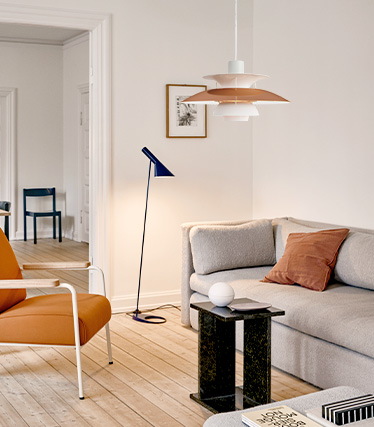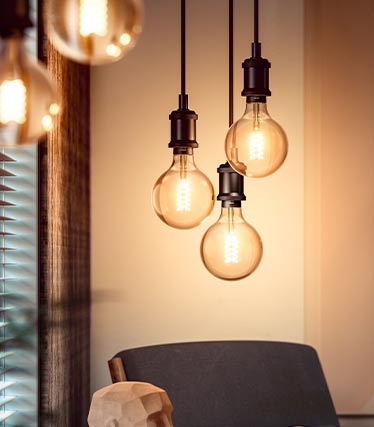:format(jpeg))
The first flat of your own
Plan, furnish, feel goodMoving into my first flat: a milestone full of excitement, freedom - and also responsibility. It's wonderful to finally be able to design your own four walls, feel free and become more independent. Even before the move starts, many questions arise: What costs will I incur? What do I need to consider? And how do I even find the right flat?
The good news? With a clever checklist you can master this transition like a pro. Our tips for your first home will not only help you get started, but also help you put together a thoughtful basic set - from important kitchen utensils to clip-on lights for the work area. Because you don't just live in your new home, you make memories here!
Experience shows one thing: taking the first available flat just because it's available can turn out to be the wrong decision. Even if the flat seems perfect at first glance, difficulties can quickly emerge: The location may not be right, the flat may be in poor condition and the service charges may be surprisingly high. It pays to be patient and take a close look.
:format(jpeg))
House hunting: strategies and tips for your first rental flat
The dream of owning your first home starts with the right flat search. With the right planning, you can not only save time, but also get the most out of every viewing appointment. It is important to be well prepared - that way you increase your chances before others beat you to it.
Our tips for finding your first home:
- Set clear priorities: It helps to consider in advance which criteria the flat should fulfil, e.g. location, size, budget and connections. The better you know your wishes and no-gos, the better you can search and weigh up your options.
- Get to know the city: You should visit the neighbourhood before you decide. Some places are not made for everyone. You should take your time to stroll through the streets, discover the neighbourhood and see whether the infrastructure and the offerings appeal to you. Map apps can help you to check the journey time to work or public transport connections - this is an important factor, especially in large cities.
- Use various platforms: Online portals, social networks and local adverts as well as personal contacts can be fruitful for finding interesting housing offers. You should use as many sources as possible, because some portals are too expensive for housing providers, which is why some flats are not available everywhere - and these can be particularly interesting.
- Prepare documents: A complete application portfolio can score points with landlords. In addition to proof of income and an attractive cover letter, a SCHUFA report is also worthwhile. A lot of time passes, especially if you have to submit additional documents.
- Flexibility pays off: Viewing flats at unusual times or in peripheral locations where there is less competition significantly increases the chances of finding an attractive flat.
- Do not allow yourself to be put under pressure: You should check the tenancy agreement carefully, look out for hidden costs and ask specifically about special regulations - e.g. obligations around the property or the requirement to carry out certain renovations at certain intervals.
- Beware of strange demands: If a landlord makes strange or unreasonable demands - for example, excessive advance payments or unusual additional conditions in the tenancy agreement - caution is advised. Such warning signs may indicate that the tenancy will become problematic later on. It's better to cancel than to burden yourself with trouble in the long term!
:format(jpeg))
The most important insurance policies and contracts
Moving into your new home not only brings joy, but also responsibility - now it's time to secure everything important. Essential insurance policies include private liability insurance and house contents insurance. Equally important: essential contracts such as electricity, internet and the licence fee must be concluded in good time to ensure that everything runs smoothly.
Personal liability insurance: This insurance is essential because it protects against high costs if damage is caused unintentionally - for example, if a friend's laptop or a neighbour's front door is accidentally damaged.
Tip: If you live in a partnership, you can often take out joint liability insurance and save money. You can also check whether you may still be covered by your parents' family liability insurance (this is often possible until you complete your first course of training).
Contents insurance: This insurance covers damage to property caused by events such as burglary, fire, mains water or storms. It is particularly useful if you own expensive furniture or electronics.
Attention: Many policies include cover for things you may not need (e.g. bicycle theft outside your home if you don't own a bicycle). It is also important to read the small print carefully in order to insure only what is really relevant for you personally.
Rent deposit insurance: Instead of paying the deposit in cash or by bank transfer, you can take out rental deposit insurance. This offers financial leeway, but is often more expensive in the long term than a direct deposit. It is particularly suitable if you cannot afford the deposit.
Essential contracts for the new home:
Electricity and gas: After moving in, you should immediately take care of the re-registration or find a new provider. Basic suppliers are often more expensive than special tariffs that you can compare online. Tip: Plan your own energy consumption realistically - a single household often needs less electricity than calculated in the standard tariff.
When do you have to change the gas yourself?
- In the case of central heating in a block of flats: If the landlord settles the heating costs via the utility bill (often in rented flats with central gas heating), you don't have to worry about the gas supplier. The landlord has the contract with the provider, and you pay the heating costs on a pro rata basis.
- If you have your own gas heating in your home: If your home has a gas boiler for heating and hot water (often in old flats), you are responsible for the gas contract. In this case, you can choose and change the provider yourself, just like with electricity.
Internet and telephone: You can easily check which providers are available in your region and make sure that the contract can be cancelled flexibly. There are often discount campaigns for new bookings that you can take advantage of. Tip: If you are moving into your first home, it is also possible that the housing association will specify the internet provider due to its monopoly position.
Broadcasting licence fee: As soon as you move into your own home, you are obliged to pay the licence fee (GEZ). This is independent of whether you are actually watching television or listening to the radio. If you do not do this, you will receive a letter requesting payment over time. So always put enough money aside for the GEZ!
Insurance for building liability (if owned): If you are buying rather than renting the property, you will need additional cover such as buildings liability insurance.
What should I look out for?
- Keep an overview of costs: Insurance and contracts quickly add up. You should think carefully about what cover is really necessary and check whether there are combined tariffs that are more favourable.
- Compare contracts: Comparison portals offer the opportunity to find the best offers for electricity, internet and insurance. There are often favourable new customer tariffs that are worthwhile.
- Plan for flexibility: You should make sure that the contracts do not have too long a term - especially in the first few years when your lifestyle could still change significantly.
:format(jpeg))
First home: checklist and tips on basic equipment
The dream of owning your first home is coming true - but what do you need for your first flat to turn it into a cosy home? With our checklist for basic equipment you are well prepared: From furniture for the bedroom, kitchen and bathroom to essential kitchen utensils, cleaning products and laundry accessories. Another thing that should not be forgotten is the lighting. Lamps play a decisive role in furnishing and create the right atmosphere in every room.
The following basic equipment covers everything you need to feel comfortable in your new home right from the start and to master everyday life without stress. It's perfectly fine to add things like decoration or additional furniture bit by bit - the important thing is that the Basis is right:
Bedroom
- Bed with mattress and slatted frame: A stable bed frame with a suitable slatted frame is important for healthy sleep. It provides ventilation and increases sleeping comfort.
- Bed linen, pillows, blankets: At least two sets so that you can always change.
- Wardrobe or chest of drawers: Tidy up your clothes and laundry.
- Bedside table lamp or table lamp: For a soft light in the evening.
- Darkening solutions: Curtains, roller blinds or pleated blinds to keep out light and create privacy.
Kitchen
- Crockery: Plates, bowls, cups, glasses.
- Cutlery: Knives, forks, spoons, cutting knives.
- Cooking utensils: Pots, pans, chopping board, wooden spoon, spatula.
- Kitchen helpers: Sieve, peeler, tin opener, scissors.
- Electrical appliances: Kettle, coffee machine, toaster, microwave.
- Basics: Salt, pepper, oil, sugar and vinegar - these are often missing when cooking for the first time.
- Cleaning agents: Washing-up liquid, sponges, tea towels.
- Waste bin with bin liners: For your daily rubbish.
- Curtains or disc curtains: Particularly important in ground floor flats to ensure privacy.
Tip: Utensils are best made from olive oak, bamboo or high-quality maple wood. These woods are durable, gentle on the knife blades and contain natural antibacterial properties. Plastic chopping boards are also suitable, but are more difficult to clean as they can become scratched, where bacteria can collect and microplastics can be lost.
Bath
- Towels (large & small): For shower, hands and face.
- Shower curtain: If necessary.
- Toilet paper and toilet brush: A matter of course, but often forgotten.
- Soap dispenser: For liquid soap or solid bar.
- Cleaning agents: All-purpose cleaner, mops, sponges, microfibre cloths, glass cleaner and more.
- Mirror: If not available as standard, for example an illuminated vanity mirror.
- Slip mat: For the shower or bathtub area to ensure safety.
Living room
- Sofa or armchair: The central place to relax.
- Coffee table: Practical for snacks, books or remote controls.
- Shelf or storage space: For books, decorations or small objects.
- Curtains or drapes: For privacy and to organise the room.
- Carpet: A larger rug defines the room and makes it cosier.
- Floor lamps or ceiling lights: For pleasant lighting and as a design element.
Tip: Cable management for more organisation: Many electronic devices in the living room, such as televisions, loudspeakers or lamps, often result in a mess of cables. Cable ducts, Velcro strips or cable boxes can be used to neatly bundle and conceal the cables. This not only ensures a tidy appearance, but also reduces tripping hazards.
Cleaning and household utensils:
- Hoover or broom and mop: To keep your home clean.
- Laundry rack and laundry basket: For regular laundry.
- All-purpose cleaner: For floors, surfaces and windows.
Lighting and electronics:
- Lamps: Ceiling lamps for every room and table or floor lamps for cosy light.
- Multiple sockets: For electronics such as televisions, laptops or lamps.
Necessary for organisation and safety:
- Tool box: Hammer, screwdriver, nails, folding rule - ideal for small repairs or for assembling furniture.
- First aid kit: Bandages, plasters, scissors - for emergencies.
- Fire extinguisher: For more safety when working in the kitchen.
Personalised feel-good accessories:
- Decorative elements: Plants, pictures, candles - for that personal touch.
- Fairy lights: For a cosy atmosphere, especially in the bedroom or living room.
- Carpets: Dampen noise and create cosiness.
- Blankets: For cosy evenings watching TV and reading.
Saving tip: If you opt for second-hand furniture and energy-saving LED bulbs, you can save on your budget and have more money available for other things.
- Prioritisation according to budget: Money can be tight, especially for the first flat. Planning helps you to concentrate on the essentials first.
- Flexibility for later purchases: Many "optional" items such as decoration or additional furniture can be added as and when more budget is available.
- Efficiency in the move: Focussing on the essentials can make your move easier and less stressful.
:format(jpeg))
Plan costs and ancillary costs correctly
Good planning for your first home is the key to a stress-free and successful start. But what should you bear in mind when it comes to costs such as rent, ancillary costs, deposit and relocation? With thoughtful budgeting, you can keep an eye on all your expenses and relax as you realise your dream of owning your own four walls
- Cold rent and ancillary costs are the main expenses for the first flat. It is best to calculate the basic rent so that it does not exceed around 30 % of your monthly income. For ancillary costs such as heating, water and waste disposal, calculate approx. 2-3 euros per square metre.
- The deposit is usually up to three months' rent and usually has to be paid before moving in. This sum should be budgeted for at an early stage.
- The removal costs include expenses for transport (e.g. hire car or removal company), packing materials and possible helpers. Depending on the size of the move, you should budget several hundred euros.
- Other costs include, for example, insurance, internet, mobile phone contracts and electricity. These must be paid regularly in addition to the rent.
Ideally, you should draw up a realistic budget overview to ensure that all fixed costs are covered and that there is enough left over for reserves and living expenses.
For the basic rent:
- Tip: It is advisable to ask at the viewing whether the service charges are a lump sum or an advance payment, as this has an impact on possible additional payments.
The removal costs include expenses for transport (e.g. hire car or removal company), packing materials and possible helpers. Depending on the size of the move, you should budget several hundred euros or ask for favours from friends.
How to plan your budget correctly:
- Create a detailed list:
- Categorise all costs into one-off expenses (e.g. removal, deposit, furniture) and regular expenses (rent, utilities, insurance).
- Plan for reserves:
- At least 10% of your income should be set aside each month for unforeseen expenses, e.g. repairs or higher utility bills.
- Use digital tools:
- Apps or Excel spreadsheets can help you track your spending and monitor your budget.
Practical savings tips:
- Furniture and furnishings: Buy second-hand furniture via classified adverts or in second-hand shops.
- Energy saving: Replace old traditional light bulbs with LED bulbs and make sure you switch off appliances in stand-by mode.
- Transport: Hire a van for the move only for the time needed to reduce costs.
- Living together: If possible, move into a shared flat to share costs such as rent and utilities.
:format(jpeg))
Flat handover: What to consider?
The handover of the flat is a decisive step into the new home. To ensure that everything runs smoothly and there are no nasty surprises, you should be well prepared and also take legal aspects into account.
Before the handover:
- Create flat handover protocol:
- Note defects such as scratches, defective windows, walls that are not properly painted or worn floors and take additional photos and document everything digitally.
- Check that all important installations such as heating, boiler and ventilation are working properly.
- Check the smoke detectors for proper functioning together with the landlord.
- Note double rent:
- Plan in good time to avoid overlapping rent payments. Sometimes new flats are not ready for occupancy until later, or the notice period for the old flat is longer. This should be factored into the budget.
- Note meter readings:
- Read the meter readings for electricity, gas and water and record them in the handover protocol. This serves as proof of when you are responsible for consumption.
- Check key:
- Ensure that all keys (including cellar, letterbox and front door) have been handed over in full and have the number confirmed in writing.
After the handover:
- Lamps and electronics:
- Install lamps and ensure that the lighting works in all rooms. Also plan for the use of multiple sockets and extension cables.
- Planning small repairs:
- Tackle minor jobs such as tightening door handles or fixing dripping taps at an early stage to avoid long-term problems.
Important points that are often overlooked:
- Witnesses only when moving out:
- It is advisable to call in witnesses** when moving out in order to avoid possible disputes about the condition of the flat. This is usually not necessary for the handover before moving in, as long as everything is documented.
- Liability for undocumented defects:
- Damage that is not documented when you move in could be charged to you later. A detailed handover protocol is therefore indispensable.
- Deposit and repayment clauses:
- The conditions in the rental agreement should be read carefully. There are often clauses that link the repayment of the deposit to conditions, such as a final inspection of the flat.
- Courageous in the discussion:
- When handing over the property, it is advisable to be bold and point out any unclear points or defects to the landlord directly. This saves discussions later and allows changes to be included in the minutes immediately.
- Put everything in writing!
- Verbal agreements can easily be forgotten or lead to misunderstandings. Therefore, all agreements should be documented in writing and kept together with the handover protocol.
Furnishing tips for a cosy home
The flat only becomes a real home with the right furnishings - and we show you how. Cosy, practical furniture, pictures, small accessories and lovingly selected decorations create a harmonious atmosphere for living and working.
Lamps play a dual role here: they not only provide light, but also set accents as stylish design elements that make rooms spotlight and create an individual ambience in which you immediately feel at home.
More ideas for your first home
Choose your styleYou can experiment with colours and materials to visually enhance rooms. Warm tones and natural fabrics, for example, make the home even cosier. Rooms inspired by the trendy loft style have a completely different but equally cosy effect. And if you want to give your furnishings a fresh kick, opt for the trendy Dopamine Decor.
Tip: Let yourself be inspired and start creating your personal feel-good place right away!
Official and organisational tasks
Moving into a new home not only brings anticipation, but also important official tasks. These should be taken care of in good time to avoid problems - especially if you are living alone for the first time.
1. Obligation to register with the residents' registration office
- Note the deadline: You must register with the Residents' Registration Office within two weeks of moving. Fines may be imposed in the event of default.
- Documents required:
- Identity card or passport
- Landlord's certificate (confirmation of moving in from the landlord)
- Tenancy agreement (sometimes required, so take it with you to be on the safe side)
Tip: Some cities offer the option of booking an appointment online to avoid long waiting times.
2. Communicate change of address everywhere
The new address should be communicated to all relevant parties in good time so that mail and important documents are not lost. This is particularly important for:
- Health insurance: So that notifications and documents are delivered correctly.
- Tax office: The tax ID is linked to the address - a change is mandatory.
- Employment office or BAföG office: For notifications and punctual payments.
- Family fund: Particularly relevant if you receive child benefit.
- Social security fund: If benefits such as social assistance or housing benefit are received.
- Bank: So that account statements and new cards are sent to the correct address.
- Online services: The address should also be adjusted for services such as Amazon, Netflix and others in order to receive deliveries and invoices correctly.
Tip: Use a mail forwarding order with Deutsche Post (or your local provider) so that incorrectly addressed letters are automatically forwarded to the new address for a transitional period.
3. Reregistration of contracts and suppliers
- Electricity and gas: Register the new address with the supplier or switch to a cheaper tariff. The meter readings should be read and kept ready when the flat is handed over.
- Internet and telephone: Check whether the existing contract can be transferred to the new address, or use the move as an opportunity to change provider.
- Broadcasting licence fee (GEZ): The fee is linked to the flat, so the new address must be reported to the contribution service.
4. Additional official tasks depending on age and life situation
- Students:
- Report the new address to the BAföG office if you are receiving financial support.
- Inform the university so that you continue to receive important messages.
- Apprentices:
- If the parents receive child benefit, ensure that the family benefits office is informed.
- Young adults under 25:
- If you have health insurance through your parents, also inform their health insurance company.
5. Keep important documents to hand
You should have these documents to hand to ensure that the re-registration process runs smoothly:
- Rental agreement
- Identity card or passport
- Tax ID
- Proof of existing contracts (e.g. electricity, gas, internet)
Additional tip: Organisation made easy
- Create a change of address list: Keep a checklist to make sure you don't forget any jobs that need an address.
- Use digital tools: Some platforms offer services for centralised address changes that can be used to inform many providers at the same time.
- Choose the time: The address changes begin before the day of the move so that mail and important messages arrive on time.
Everyday tips for getting started in your first home
Starting out in your first flat is exciting, but also a big responsibility - but with our everyday tips, your first flat will not only be a place to relax, but also a safe, well-organised home.
:format(jpeg))
- Cleaning and laundry:
- Introduce fixed routines for cleaning work, e.g. a weekly cleaning schedule for the kitchen, bathroom and living areas.
- Schedule specific days for laundry to avoid chaos - especially with small laundry racks.
- Efficient cleaning products such as all-purpose cleaners or microfiber cloths save time and money.
- Waste separation:
- Inform about the local waste separation system. There are usually garbage cans for residual waste, paper, glass and organic waste.
- Provide several small garbage cans in the kitchen to make separation easier. A good waste system saves space and keeps the home clean.
- Purchase planning:
- Keep shopping lists to avoid impulse purchases. Plan meals for the week in advance so that nothing spoils.
- Weekly markets or discount campaigns can help to get fresh food cheaper.
:format(jpeg))
Your first home also means taking responsibility for your own energy and electricity costs. Here are a few simple measures to save energy:
- Switch off electronics: Appliances in stand-by mode often consume electricity unnecessarily. Multiple sockets with switches help to switch everything off with a single click.
- Efficient use of light sources: LED bulbs save electricity and last longer than traditional light bulbs.
- Heating with sense:
- Only heat rooms when you are using them and turn the heating down at night.
- Seal windows and doors to prevent heat loss.
- Save water: Install water-saving nozzles for shower heads and taps - these reduce consumption considerably.
Conclusion: A successful start to your first home
Moving into your first home is an exciting step - and if you pay attention to the most basic points, you will be well prepared. Well thought-out budget planning and good organisation are important to make the first few weeks stress-free. Our tips for long-term relaxed living also show you how to create a home in which you feel completely at ease - from the furnishings to the neighbourhood. So nothing stands in the way of a successful start.






















































:format(jpeg))
:format(jpeg))
:format(jpeg))
:format(jpeg))
:format(jpeg))
:format(jpeg))
:format(jpeg))
:format(jpeg))
:format(jpeg))
:format(jpeg))
:format(jpeg))
:format(jpeg))
:format(jpeg))
:format(jpeg))
:format(jpeg))
:format(jpeg))
:format(jpeg))
:format(jpeg))
:format(jpeg))